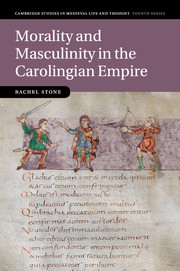Book contents
- Frontmatter
- Contents
- Illustrations
- Acknowledgements
- A note on translation
- Abbreviations
- The Carolingian empire
- Genealogy of Carolingian rulers
- Chapter 1 Introduction
- Chapter 2 Moral texts and lay audiences
- Chapter 3 Warfare
- Chapter 4 Imagining power
- Chapter 5 Central power
- Chapter 6 Personal power
- Chapter 7 Power and wealth
- Chapter 8 Marriage
- Chapter 9 Sex
- Chapter 10 Men and morality
- Bibliography
- Index
Chapter 6 - Personal power
Published online by Cambridge University Press: 05 November 2011
- Frontmatter
- Contents
- Illustrations
- Acknowledgements
- A note on translation
- Abbreviations
- The Carolingian empire
- Genealogy of Carolingian rulers
- Chapter 1 Introduction
- Chapter 2 Moral texts and lay audiences
- Chapter 3 Warfare
- Chapter 4 Imagining power
- Chapter 5 Central power
- Chapter 6 Personal power
- Chapter 7 Power and wealth
- Chapter 8 Marriage
- Chapter 9 Sex
- Chapter 10 Men and morality
- Bibliography
- Index
Summary
The role of personal power, derived from specific social relationships, has been a key theme of early medieval research for several generations. The German ‘new constitutional history’, which developed in the 1930s, saw such personal ties as the key to all social structures: the Carolingian empire, like its contemporaries, was a Personenverbandsstaat (‘state’ based on personal ties rather than institutions). All forms of power in the Germanic world, scholars argued, could be derived from Herrschaft (lordship). This constitutional history paradigm has now been substantially undermined, although without entirely losing its grip. Nevertheless, scholars still agree that much power in Carolingian society was exercised and experienced through such relationships between individuals. Whether these ‘personal’ relationships were in practice defined or marked by particular social or emotional closeness is a different matter.
Carolingian authors did not provide a systematic guide to social morality as Rather of Verona did in the late tenth century, when he set out the behaviour expected of social groups from parents and old men to soldiers and doctors. Many Frankish texts do provide information, however, on behavioural norms for both male and female elites within power relationships. In turn, this chapter will explore the expectations of relationships that male noblemen had with their household and dependants (particularly the unfree), with their lords and their own followers, and with their kin and friends. Although these conceptual categories are used for ease of analysis, however, it is important to realise that both moralising and legislative sources are sometimes vague on the exact social relationships involved.
- Type
- Chapter
- Information
- Morality and Masculinity in the Carolingian Empire , pp. 174 - 213Publisher: Cambridge University PressPrint publication year: 2011



